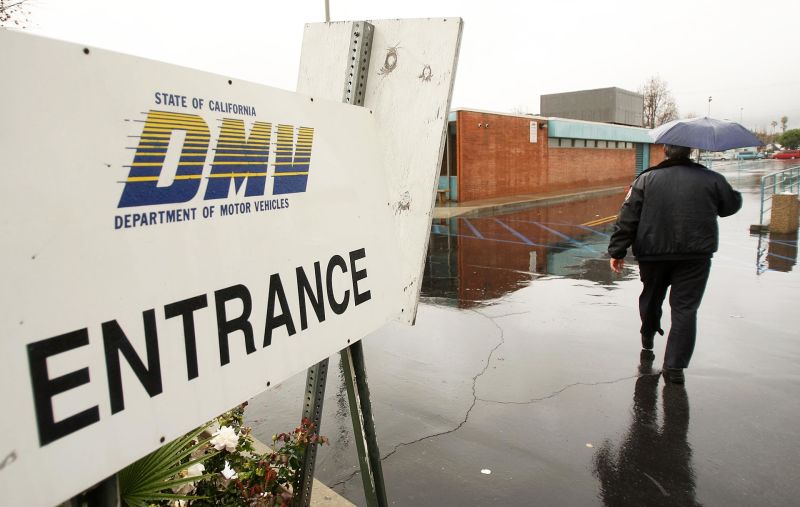"There's just certain kinds of minor offenses where you shouldn't lose your license, because the license is just too important to your livelihood," said Hertzberg (D-Van Nuys), adding that his bill aims to fix this part of the criminal justice system to "align the nature of the harm with the nature of the punishment."
"If someone gets a broken tail light or something like that, should they lose their license? Our answer is no. But if they are caught drunk driving, should they lose their license? Of course," said Hertzberg.
In California and other states, license suspensions are currently used by the courts as a way to pressure drivers into paying traffic tickets and other court-imposed fines, which can snowball quickly into hundreds of dollars if drivers miss payment deadlines.
When California courts notify the DMV of two or more failures to pay or appear in court for violations, the DMV suspends the driver’s license.
That practice has resulted in over 4.8 million Californians -- many of whom are low income or people of color -- having their driver's licenses revoked for minor violations, said Elisa Della-Piana, legal director for the Lawyers' Committee for Civil Rights of the San Francisco Bay Area, an SB881 sponsor.
Della-Piana co-authored the report "Not Just a Ferguson Problem, How Traffic Courts Drive Inequality in California," which found that the loss of a driver's license often plunges low-income Californians deeper into poverty because it hinders their ability to keep or find a job.
"For the past eight years we've seen people flooding into our legal clinics who could have a job if they had a driver's license," said Della-Piana. "And so for this (issue) to be at the forefront of the California state Legislature's agenda, for this to be on the governor's radar, gives me so much hope that those 4.8 million Californians will get the relief that they've needed for a long time."
A 'Hellhole of Desperation'
Gov. Jerry Brown has characterized the system that leads to drivers losing their licenses because they can’t pay fines or fail to appear in court as a “hellhole of desperation.”
That hellhole of desperation includes the permanent loss of a car for some drivers with suspended licenses. If law enforcement catches a driver at the wheel with a revoked license, they may impound the driver's vehicle for a statutory 30-day period, even if the initial violations that resulted in the license suspension were minor.
In California, over two-thirds of the 439,750 court-ordered suspensions in 2014 were related to non-DUI offenses, according to the DMV.
A KQED/Peninsula Press investigation found that in the Silicon Valley city of Menlo Park, DUI offenses are related to just 15 percent of the suspended license citations since 2008. More than half of the cars Menlo Park police impounded in those incidents were never recovered by owners, possibly due to the city's steep 30-day impound charges -- with a minimum price tag of $2,300 -- that owners must pay mostly to towing companies to get their cars back.
The problem is statewide, as towing companies are seeing a big drop in the number of owners retrieving their vehicles after a 30-day impound, the investigation found.
In California, uncollected court-ordered debt for traffic and criminal offenses adds up to an estimated $10.2 billion, according to the Legislative Analyst’s Office.
Sen. Hertzberg says allowing drivers with minor violations to keep their licenses could help the state recover some of that money, because drivers could drive legally to work and earn a living.
"We would actually gain money for the system and at the same time create a sense of fairness for folks," he said.
State Could Still Use Debt Collectors, Amnesty Program
But if drivers are allowed to keep their driver's licenses, will they still pay their traffic tickets? Hertzberg says yes. Under SB881, courts could still contract with private debt collectors to accrue delinquent debt. Other collection measures include placing liens on a debtor's real estate property, and garnishing wages and bank accounts.
A statewide traffic amnesty program that will continue through March 31, 2017, also aims to recover some of that debt. Depending on income, drivers with traffic infractions before 2013 will get their debt reduced by 50 to 80 percent and get their licenses reinstated if they sign up to pay that reduced amount.
Janet Campos, a mother of two from Hayward, found out she does not qualify for amnesty because her traffic violations occurred after 2013.
Campos, an administrative assistant at a home insurance company, says that losing her driving privilege has become a huge burden: traveling 20 miles to her job takes a lot longer by public transportation than driving. Not being able to legally drive also makes it harder to get groceries on rainy days and pick up her two kids from school. Transportation became such a tough issue for her family that she had to pull her children from baseball practice.
"Right now they are not in sports because I can't drive them anywhere," said Campos, 33.
To get her license back, Campos says she would have to pay more than $2,300 in fines that have been tacked on to the original cost of her traffic ticket. It's money she says she doesn't have. That's why she considers Sen. Hertzberg's bill welcome news.
"Getting my license back would just take a lot of weight and stress off my shoulders," says Campos, who struggled with depression after her license was suspended in 2014. "I'd be able to just focus at work and not have to leave earlier to catch a bus so I can pick up my children on time."
SB881 has no official opposition yet, but that could arise during the bill's first hearing at the Senate Public Safety Committee or the Senate Transportation and Housing Committee in the next few months, according to Hertzberg's office.

